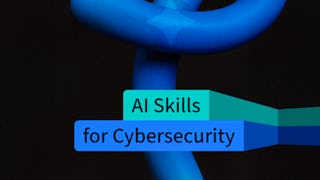- Browse
- Pseudo Code
Results for "pseudo-code"
 Status: Free TrialFree Trial
Status: Free TrialFree TrialSkills you'll gain: Prompt Engineering, Prompt Patterns, ChatGPT, Generative AI, Responsible AI, IBM Cloud, AI Workflows, No-Code Development, Machine Learning Software, Model Deployment, Natural Language Processing, Machine Learning, Artificial Intelligence, Self Service Technologies, Application Deployment, Real Time Data, Artificial Intelligence and Machine Learning (AI/ML), Robotics, Deep Learning, Data Science
4.7·Rating, 4.7 out of 5 stars35K reviewsBeginner · Specialization · 3 - 6 Months
 Status: Free TrialFree Trial
Status: Free TrialFree TrialSkills you'll gain: Software Development Life Cycle, Linux Commands, Software Architecture, Bash (Scripting Language), Restful API, Shell Script, Git (Version Control System), GitHub, Software Design, Flask (Web Framework), Version Control, File Management, Linux, Software Development Methodologies, Software Design Patterns, Application Deployment, Data Import/Export, Programming Principles, Web Scraping, Python Programming
4.6·Rating, 4.6 out of 5 stars51K reviewsBeginner · Specialization · 3 - 6 Months
 Status: Free TrialFree TrialG
Status: Free TrialFree TrialGGoogle
Skills you'll gain: Program Development, Programming Principles, Python Programming, Computer Programming, Computational Thinking, Problem Management, Data Structures, Integrated Development Environments, Debugging, Development Environment
4.8·Rating, 4.8 out of 5 stars40K reviewsBeginner · Course · 1 - 3 Months
 Status: Free TrialFree Trial
Status: Free TrialFree TrialSkills you'll gain: Git (Version Control System), GitHub, Version Control, Continuous Integration, Software Versioning, Collaborative Software, Software Development Tools, Code Review, Issue Tracking, Command-Line Interface
4.8·Rating, 4.8 out of 5 stars8K reviewsBeginner · Course · 1 - 4 Weeks
 Status: Free TrialFree Trial
Status: Free TrialFree TrialSkills you'll gain: Prompt Engineering, Prompt Patterns, ChatGPT, Generative AI, Cyber Threat Intelligence, Security Information and Event Management (SIEM), AI Security, Threat Modeling, Threat Detection, Cybersecurity, Incident Response, Malware Protection, Real Time Data, Artificial Intelligence and Machine Learning (AI/ML), AI Workflows, Anomaly Detection, AI Personalization, Vulnerability Management, Artificial Intelligence, Incident Management
4.7·Rating, 4.7 out of 5 stars11K reviewsIntermediate · Specialization · 1 - 3 Months
 Status: Free TrialFree TrialS
Status: Free TrialFree TrialSStanford University
Skills you'll gain: Data Structures, Graph Theory, Algorithms, Bioinformatics, Theoretical Computer Science, Network Model, Programming Principles, Social Network Analysis, Network Analysis, Computational Thinking, Analysis, Computer Science, Network Routing, Probability, Pseudocode, Computational Logic, Operations Research
4.8·Rating, 4.8 out of 5 stars6K reviewsIntermediate · Specialization · 3 - 6 Months
 Status: Free TrialFree Trial
Status: Free TrialFree TrialSkills you'll gain: Microsoft Power Platform, Microsoft Copilot, Prompt Engineering, Microsoft Power Automate/Flow, Power BI, Microsoft 365, Multimedia, Microsoft PowerPoint, Dashboard, Microsoft Excel, Excel Formulas, Microsoft Word, Data Visualization, No-Code Development, Spreadsheet Software, Collaborative Software, Microsoft Office, Power Apps Component Framework, Presentations, Data Analysis
4.7·Rating, 4.7 out of 5 stars7.1K reviewsBeginner · Specialization · 3 - 6 Months
 Status: Free TrialFree Trial
Status: Free TrialFree TrialSkills you'll gain: Prompt Engineering, Prompt Patterns, ChatGPT, Generative AI, Data Ethics, Software Development, Real Time Data, Artificial Intelligence and Machine Learning (AI/ML), Application Security, DevSecOps, AI Workflows, Software Engineering, AI Personalization, Machine Learning, Context Management, Decision Making
4.7·Rating, 4.7 out of 5 stars11K reviewsIntermediate · Specialization · 1 - 3 Months
 Status: Free TrialFree Trial
Status: Free TrialFree TrialSkills you'll gain: Gemini, API Gateway, Cloud Applications, Kubernetes, Google Cloud Platform, Containerization, Cloud Infrastructure, Cloud Development, Application Deployment, Prompt Engineering, CI/CD, Serverless Computing, Cloud-Native Computing, Microservices, Data Persistence, Application Development, Identity and Access Management, Cloud Computing, Cloud Storage, Debugging
4.7·Rating, 4.7 out of 5 stars49K reviewsIntermediate · Professional Certificate · 3 - 6 Months
 Status: Free TrialFree Trial
Status: Free TrialFree TrialSkills you'll gain: Prompt Engineering, Prompt Patterns, ChatGPT, Generative AI, AI Personalization, Mobile Development, Anthropic Claude, Data Ethics, LLM Application, Apple iOS, AI Product Strategy, Machine Learning Methods, Software Development, Application Design, Cloud Development, Data Strategy, Real Time Data, Artificial Intelligence and Machine Learning (AI/ML), Application Security, DevSecOps
4.7·Rating, 4.7 out of 5 stars11K reviewsAdvanced · Specialization · 1 - 3 Months
 Status: Free TrialFree TrialU
Status: Free TrialFree TrialUUniversity of California San Diego
Skills you'll gain: Data Structures, Graph Theory, Algorithms, Program Development, Bioinformatics, Data Storage, Development Testing, Theoretical Computer Science, Computational Thinking, Network Analysis, Test Case, Programming Principles, Computer Programming, Python Programming, C and C++, Java, Rust (Programming Language), Javascript, Software Testing, Debugging
4.6·Rating, 4.6 out of 5 stars17K reviewsIntermediate · Specialization · 3 - 6 Months
 Status: Free TrialFree Trial
Status: Free TrialFree TrialSkills you'll gain: Django (Web Framework), Responsive Web Design, Cascading Style Sheets (CSS), HTML and CSS, Back-End Web Development, Relational Databases, Object Oriented Programming (OOP), Database Management Systems, Bootstrap (Front-End Framework), SQL, Database Design, Databases, Front-End Web Development, Database Administration, Unit Testing, MySQL, Web Development, Computer Programming, Pseudocode, Communication
4.7·Rating, 4.7 out of 5 stars17K reviewsBeginner · Specialization · 3 - 6 Months
Searches related to pseudo-code
In summary, here are 10 of our most popular pseudo-code courses
- AI Foundations for Everyone: IBM
- Applied Software Engineering Fundamentals: IBM
- Crash Course on Python: Google
- Introduction to Git and GitHub: Google
- IBM Generative AI for Cybersecurity Professionals: IBM
- Algorithms: Stanford University
- Master Microsoft Office 365 and Power Platform: Microsoft
- Generative AI for Software Developers: IBM
- Preparing for Google Cloud Certification: Cloud Developer: Google Cloud
- Generative AI for Mobile App Developers: IBM










